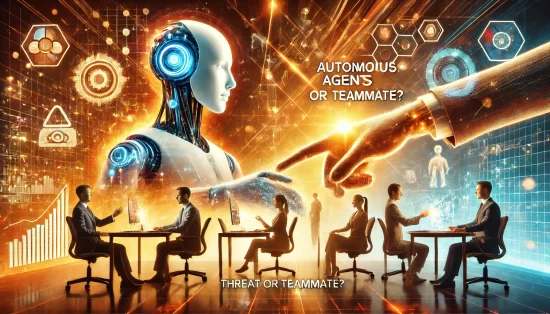Precap:
-
Autonomous agents are rising fast—but won’t fully replace knowledge workers.
-
Instead, they’ll augment our abilities—if we learn to use them.
-
The future belongs to those who can collaborate with AI, not compete with it.
In the age of artificial intelligence, one question is quietly echoing across offices, Slack channels, and executive boardrooms:
“Will autonomous agents replace knowledge workers—or work alongside them?”
This isn’t just a tech dilemma—it’s a philosophical, economic, and human challenge. As AI moves from reactive tools to autonomous agents capable of planning, decision-making, and even collaboration, knowledge workers—from analysts to marketers to engineers—are facing a crossroads.
Will they be outpaced by their digital counterparts?
Or will they become augmented professionals, supercharged by tireless, intelligent assistants?
Let’s explore both sides.

What Are Autonomous Agents, Really?
Before we dive into the implications, it’s worth defining what we mean by autonomous agents.
Unlike basic AI tools that rely on single prompts, autonomous agents are systems that:
-
Plan tasks
-
Collaborate with other agents
-
Retrieve information
-
Execute actions
-
Reflect and adapt
Think of them as AI workers with initiative. Tools like AutoGen, LangGraph, MetaGPT, and CrewAI are enabling these agents to take on increasingly complex workflows—from writing code to analyzing markets to booking meetings.
They don’t just answer questions. They get things done.
The Replacement Narrative: Why People Are Worried
The concern that machines will replace humans isn’t new. From the Industrial Revolution to the rise of computers, every technological leap has sparked fears of obsolescence.
But this time feels different—because autonomous agents are no longer confined to manual labor or data processing. They’re operating in the realm of:
-
Strategy
-
Writing
-
Decision-making
-
Customer service
-
Software development
In other words, they’re encroaching on what was once considered exclusively human cognitive labor.
Imagine this:
-
A copywriting agent that generates, edits, and A/B tests ad campaigns.
-
A developer agent that debugs and commits code to GitHub.
-
A research agent that summarizes 200 PDFs overnight.
For many professionals, this triggers a sense of existential unease:
“If the AI can do my job better and faster, where do I fit in?”
The Collaboration Narrative: Why That’s Not the Full Story
Now here’s the twist: while autonomous agents are powerful, they are not human.
They don’t:
-
Understand nuance
-
Make ethical judgments
-
Handle ambiguity with intuition
-
Build relationships
-
Think creatively beyond patterns
These gaps are not bugs—they are the moat.
What we’re seeing is not the replacement of knowledge workers, but the rise of a new working model: co-piloting.
The most forward-thinking companies are already pairing human intelligence with AI autonomy:
-
A data analyst uses an agent to prep dashboards overnight, so she can focus on storytelling and insight.
-
A lawyer uses agents to scan contracts for risk, while they handle negotiation strategy.
-
A marketer uses autonomous agents for SEO analysis, while focusing on brand voice and messaging.
In this model, AI is not the enemy. It’s the intern—fast, tireless, and eager to learn.
What Changes: The Role of the Knowledge Worker
The knowledge worker of tomorrow isn’t just someone who knows things.
They are someone who knows how to orchestrate intelligence—human and artificial.
This requires a new mindset:
-
Prompt engineering becomes task design.
-
Linear workflows become agent-led orchestration.
-
Output checking becomes ethical review and narrative crafting.
In short, your role evolves from executor to editor, director, strategist.
If you know how to wield autonomous agents effectively, you’re not competing with them. You’re leading them.
Risks and Realities: It’s Not All Hype
Let’s be clear—this transition isn’t without friction.
Job Displacement Will Happen
Some roles will shrink or disappear. Just as spreadsheets disrupted bookkeeping, autonomous agents may reduce demand for rote research or entry-level analysis roles.
Skill Gaps Will Grow
Those who can design agent workflows will thrive. Those who don’t will risk irrelevance. The gap between “prompt user” and “agent orchestrator” is widening.
Ethics and Trust Matter
Autonomous agents raise serious concerns: hallucinations, data security, bias. Human oversight must remain central.
This is why replacement is not the goal—responsible augmentation is.
A Future of Human-AI Teams
We’re heading into a world where autonomous agents will be:
-
Embedded in our workflows
-
Personalized to our roles
-
Evolving alongside us
The winners won’t be those who resist AI—but those who ask:
“How can I do what I do best—and let AI handle the rest?”
In this future:
-
The journalist becomes a curator of truth, assisted by agents verifying sources.
-
The engineer becomes a systems thinker, with agents handling syntax and deployment.
-
The strategist becomes a meta-thinker, using agents to simulate and test scenarios.
This is not about being replaced.
It’s about being redefined.
Conclusion: The Human Advantage
In chess, when humans competed against AIs, the machines won.
But when teams were formed—a human plus AI vs. just AI—the hybrid team often outperformed both.
Why? Because intuition + calculation beats either one alone.
The same will be true in knowledge work. The agent can write the code. You decide if it’s solving the right problem. The agent can draft the memo. You shape the voice, the vision, the nuance.
Autonomous agents aren’t here to take your seat at the table.
They’re here to give you a bigger one.




